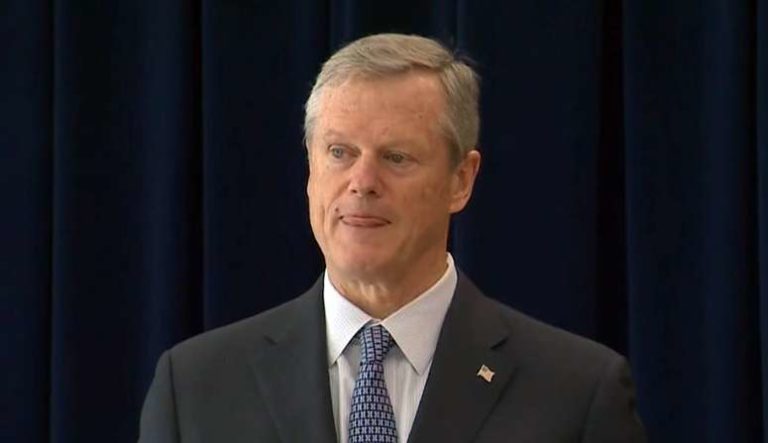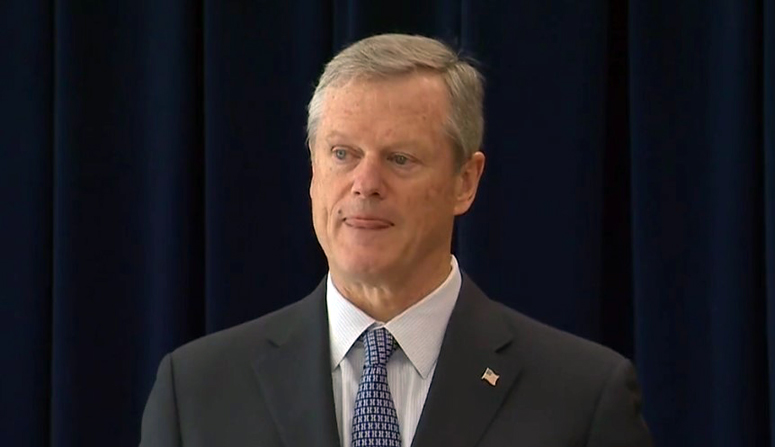

The state Republican Party on Wednesday night united behind resolutions supporting Israel and opposing universal mail-in voting in Massachusetts, but the gathering did not seem to calm the tensions that have been boiling between conservatives and party members more loyal to Gov. Charlie Baker.
The MassGOP’s governing body assembled behind closed doors Wednesday night in Marlborough amidst a still-burning controversy over anti-gay comments made by Republican state committeewoman Deborah Martell.
Baker and nearly every elected Republican in the Legislature has called for Martell to step down from the state committee, but MassGOP Chairman Jim Lyons has refused to demand her resignation, defending her right to free speech.
Martell was allowed to address the committee at the start of the meeting, which came as a surprise to some in attendance, and said she would not resign over her email to committee members in which she said she was “sickened” that 2nd Congressional District candidate Jeffrey Sossa-Paquette had adopted children with his husband.
Tom Mountain, the vice chair of the party, said he is no longer on speaking terms with Lyons, calling the controversy over Martell “the final straw.” Mountain said the meeting featured “a lot of shouting” and he said Lyons also used the occasion to defend himself against critics.
“At this stage, I’m just completely fed up. I’m tired of him moving the party in this direction to the point that we’re now crazy and saluting members who make bigoted remarks about a gay candidate because he adopted children,” Mountain said in an interview Thursday morning.
The party did adopt a resolution declaring racism and bigotry “completely inconsistent with the Republican Party’s platform,” but it did not include the penalties proposed by Norfolk Rep. Shawn Dooley in the original version that would have withheld the party’s support for any candidate that makes offensive remarks.
“It’s not a happy picture in the MassGOP. We’re losing a lot of donors. We’ve lost a lot of support and we’re now are in the middle of a public relations disaster. It’s a very contentious time. It really is,” Mountain said.
Lyons aimed to paint a more unified portrait of the MassGOP coming out of a meeting in which the state committee adopted a number of resolutions, including one expressing support for Israel’s right to defend itself, one supporting a requirement of “proof of citizenship through voter identification” in order to vote, and a third opposing the permanent adoption of mail-in voting.
The House could vote at the State House as soon as Thursday on a plan that would make mail-in voting a permanent option for Massachusetts voters in biennial state elections after using the process during the COVID-19 pandemic to limit people’s exposure to the virus at the polls.
Asserting that thousands of mail-in ballot applications were sent to incorrect addresses last cycle, the committee voted to “oppose all efforts” to make mail-in voting permanent.
“Republicans are free to disagree on plenty of things and have plenty of different opinions, but our collective resolve to stand in solidarity behind important issues like election integrity and supporting our nation’s most loyal allies is unmatched,” Lyons said in a statement.
The governor has also butted heads with party leadership over a plan hatched by more conservative members of the party to weaken the governor’s position on the executive committee, which currently has the authority to endorse in Republican primaries.
Though proponents backed off a plan to remove Baker and other elected Republican officeholders from the committee, they did vote in support of stripping the executive committee of its power to endorse in Republican primaries.
Under the new plan, which must be redrafted and approved at the state committee’s September meeting, a two-thirds vote of the full 80-member state committee would be required to endorse in a primary.
“How it is done. This resolution, passed unanimously, holds the meat of the Lyons reform. Doesn’t fit the narrative of a deeply divided state committee,” Wendy Wakeman, a Republican strategist and Lyons ally, wrote on Twitter.
Lyons, in a statement after the meeting, said the outcomes of the resolutions “put on notice” anyone who wants to continue to sow division within the party.
“There are those that spend so much time trying to sow chaos within the Massachusetts Republican Party, as shown by recent media coverage, but I’m proud tonight to say that Massachusetts Republicans State Committee members found common ground on several positions that matter most,” Lyons added.
Former Rep. Geoff Diehl, who is considering running for governor in 2022, said he did not think the party was as fractured as critics suggest. The state committee member said “everything that was accomplished was done by voice vote and only one or two items weren’t unanimous.”
“I thought Chairman Lyons was able to accomplish a great deal in the span of the 3 hr 15 min meeting!,” Diehl texted.
The committee, which did not permit media coverage of its Wednesday evening meeting in Marlborough, did not vote on Diehl’s proposal to lower the threshold at the MassGOP convention next year to qualify for the ballot from 15 percent to 10 percent of delegates. Diehl said he withdrew it to “keep the option open,” but felt he accomplished what he wanted, which was to encourage participation and dispel the notion that MassGOP leadership might actually try to increase the threshold to make it more difficult for Gov. Baker.
“Having put forth the motion seemed to alleviate that concern, in the end, with no need to make any changes,” Diehl said.
The state committee also adopted a resolution opposing further mask-wearing mandates, stating that masks should be voluntary for vaccinated and unvaccinated residents and that the Legislature should pass “checks and balances as well as clearly defined parameters” on a governor’s authority to impose mask mandates or other restrictions during an emergency.
The meeting took place at the Apex Entertainment Center in Marlborough in a room that party officials said had a capacity limit of 100, which led to some interested Republicans and the media being denied access. Mountain said that he sought to allow more people to enter the room, which had space for additional attendees, but was refused.
Of the 4.73 million total registered voters in February 2021, there were nearly 460,000 registered Republican voters in Massachusetts, according to state data, down from the party’s highwater mark this century of more than 546,000 in October of 2000. There were 1.49 million registered Democratic voters in February across Massachusetts, and 2.72 million voters registered unenrolled.
(Copyright (c) 2021 State House News Service.